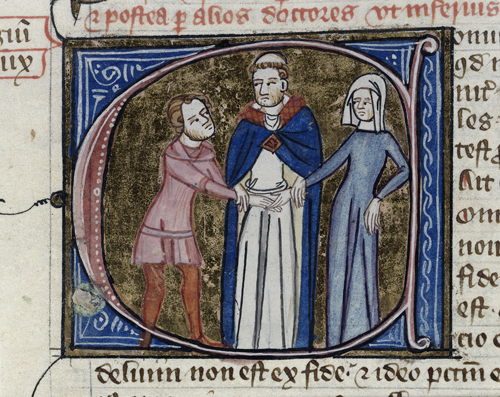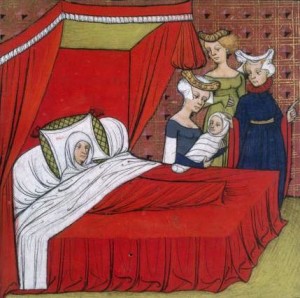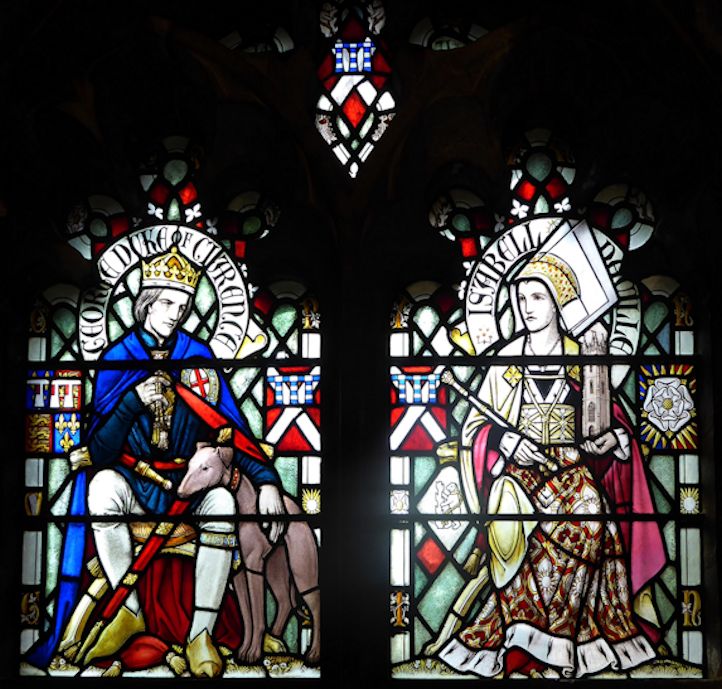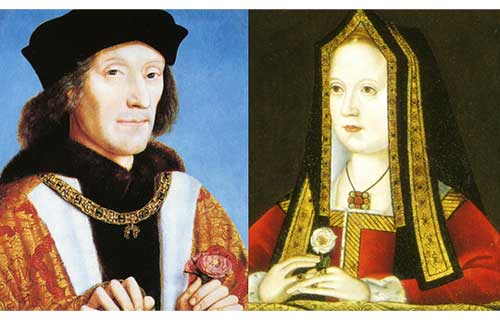
We are always being told that medieval aristocratic marriages (and indeed most medieval marriages) were arranged and did not feature love. The object was to increase property and lands, enhance a family’s reputation and produce as many heirs as was humanly possible. I pity those women who had a child a year throughout their married life. No modern medicine should anything go wrong, just a sad demise and a husband immediately seeking a replacement.

Was it like that? Looking at records you’d certainly think so, yet there are some very famous examples of kings and magnates who fell apart when they lost their queens. I have chosen three such men, Richard II, George of Clarence and Henry VII . Their marriages were dynastic, or at least arranged for profit, yet the brides seemed to have won these men’s hearts and dependence.

Anne of Bohemia wasn’t much of a catch as far as Richard II was concerned, but he chose her over a much wealthier Visconti bride who would have brought a huge dowry and a lot of influence in Italy. Anne, on the other hand, had to be purchased from her brother! She was not a popular choice in England, but by choosing her, it’s almost as if Richard sensed she was the one for him. Yes, a fanciful notion on my part, but the pair were happy together, seemingly from the outset, and when she died he tore down the palace where she had breathed her last. It’s said he would not go anywhere he had been with her, although I think that is probably a myth. He could hardly refuse to go into Westminster Abbey, for instance.
Richard’s interests were in the arts, not warfare, and throughout his life, from being a boy king, he was surrounded my warlike barons and grasping uncles. He was, as the old song goes, “a lonely little petunia in an onion patch”. And those onions were big and generally hostile.

English history would have been very different if Anne had given him heirs. He certainly crumbled when she died suddenly, descending into a state that is always referred to as a tyranny. The petunia grew gigantic and poisonous, developed thorns and began to weed out the onions, spreading itself swiftly into their vacated places. But Richard went too far. His word was never to be trusted and he made some unbelievably bad decisions, so that he eventually lost his kingdom to his cousin, who became the first Lancastrian king, Henry IV. Had Anne’s gentle influence kept Richard in check? I would guess so. Without her, he went haywire.

I would also guess that Isabel Neville had the same soothing effect on George of Clarence, whose notoriously unpredictable and rash temperament eventually led to his death in the Tower, branded a traitor by his brother, Edward IV. The legend of George being drowned in a butt of malmsey may be just a legend, or it might be founded in truth. Did George have a drink problem?
He was certainly a very unhappy man, the middle brother, angry and resentful…and maybe possessed of the knowledge that his elder brother’s marriage was bigamous. That would make George the next trueborn heir to the throne. But the truth never came out, and although he’d misbehaved considerably before Isabel’s death in childbed, he certainly imploded when she was no longer there.
He had married her to get at the enormous inheritance of her father, the Earl of Warwick (whom he also hoped would help him to the throne) but Isabel proved to be good for him. Maybe you will not agree with my assessment of George, but the fact remains that he was never the same again after losing her.

Finally there is Henry VII. He was obliged to marry Elizabeth of York. He’d made a vow before invading England that he would unite the warring houses of York and Lancaster through marriage, and once treachery had made him king, he resented the thought of having a Yorkist bride forced upon him. He delayed as long as he could, until he was told to get on with it. So they were married. What that wedding night was like we will never know, because he was a resentful groom, and she was probably an equally resentful bride. But a son and heir was born eight months later, so they didn’t lie back to back until the morning.
Like Richard II and George of Clarence before him, Henry came to rely on Elizabeth’s gentle influence, and their marriage was certainly successful. She wasn’t the first lady of his realm, his mother had that honour, but Elizabeth was the one who shared his bed…and perhaps his confidences. The one with whom he could relax and enjoy a little welcome privacy.
When she died, he went to pieces. He shut himself away for weeks on end, broken with grief. He was never an easy man, but she had won his heart and his trust, and now he had lost her. The Henry who emerged from hiding was not the same man. All the worst aspects of his character, seemingly held in check when Elizabeth was there for him, now came to the fore with a vengeance. He was cruel, rapacious, spiteful, grasping and hated, and the populace believed he had nothing more on his mind than planning how to screw more money out of them. The royal coffers bulged. The illustration below is probably not far from the truth. He and his notorious henchmen, Empson and Dudley, putting their heads together in some new royal skulduggery or other.

Very few mourned Henry when he finally passed away, leaving England in the tender clutches of his son and heir, Henry VIII, from whom all women should have been immunised!
Now, I do not deny that there were love matches in the medieval period—of course there were—but I do not think they were the majority. Most marriages were a case of gradual respect, affection, and if they were lucky, of love itself. I believe Richard II, George of Clarence and Henry VII loved their wives, and once those ladies had gone, the inner demons took over.

Viscountess, I thought I was the only one who remembered that song (‘Lonely Little Petunia’) Was it popular in the UK, too? We must be about the same age. If so, don’t admit it!
LikeLiked by 3 people
OK, I’m not admitting it!!! It used to be on the radio/wireless when I was a child, and I loved it. I felt so sorry for the petunia.
LikeLike
I know this song too…my mother sang it to me as a little kid.
LikeLiked by 1 person
And mine, hoodman1! I was so sad for that poor little petunia.
LikeLike
I guess being a king could be a lonely place even though you were surrounded by people…
LikeLiked by 1 person
I wonder if any of them ever wished the crown was on someone else’s head?
LikeLike
I think you could possibly put Richard the third in that category as well, It is unlikely he married for love but I remember reading somewhere that he wept openly at her graveside and locked himself away in his chambers for three days.
They do appear to have spent a lot of time together and jointly grieved the loss of their son. I suppose they may have spent time together to increase the chances of a pregnancy……
LikeLiked by 1 person
Agreed, skiinglady. I just chose three. Somehow it’s hard to think of Richard as being grief-stricken. By that I don’t mean I can’t imagine him being so, just that I find it painful to think of him at such a time. I’m the same with Bosworth Field. I could no more go there than I could fly.
LikeLike
What about Edward I and Eleanor of Castille? I don’t really know anything about them, but he did have all those crosses made in her memory. Or was that just show?
LikeLiked by 1 person
Yes, Edward I as well. He certainly made a great thing of the Eleanor Crosses, and yet otherwise seemed a really hard, remote, ruthless man.
LikeLiked by 1 person
Just a small quibble here. I don’t necessarily think Henry ‘delayed the wedding as long as he could’ Five months doesn’t seem an excessive length of time to arrange a formal wedding, even for commoners, never mind Royals. Those who have done it, know.
Also, he wanted Parliament to petition him to marry Elizabeth, so he in turn could ask them for funds.
LikeLiked by 1 person
That last sentence sounds like the Henry we know and love. He was determined to be crowned in his own right, so didn’t marry her until that was safely done.
LikeLike
Also, until 1492, when ‘protection money’ from France started coming in, Henry was living from hand to mouth – on a grand scale, to be sure, but still barely breaking even. He often had to borrow money, then find some way to pay off the loan, then float another loan, etc.
That Henry had the soul of an accountant (what’s wrong with accountants, anyway?) may have made this easier, but it can’t have been really easy.
LikeLiked by 1 person
Poor chap. My heart bleeds. But no one MADE him invade, kill Richard and then plant his own scrawny backside on the stolen throne. If he had a tough time of it as a consequence, all I can say is – “Good!” Pity it didn’t last until the day he turned up his equally scrawny toes. Hmm, guess I’m not a member of the Henry VII Appreciation Society.
LikeLike
I would disagree with the statement that Elizabeth of York had won Henry’s “heart and trust”. There are good reasons and enough evidence to think that she did win his heart – whether it was what we would consider romantic love today, or affection that comes out of years of living together and having children together. However, there is little evidence that she ever managed to entirely win his trust, and quite a bit of evidence to the contrary. He kept her short of money and powerless all her life, while his mother Margaret Beaufort was the one who had all the powers that the Queen Consort was supposed to have. Some of the people who like to believe in the perfect marriage fairytale usually try to argue that she may not have wanted political power, but 1) there is no evidence of her feeling that way, 2) what evidence we do have of what contemporaries who had met her thought (the Spanish ambassador) suggests that they thought she was clearly unhappy with the situation, and 3) it seems incredibly unlikely for a woman who had been brought up to expect herself to be a Queen Consort one day (of a foreign country, probably France) and had been taught and prepared for that role, and who also had the example of her mother Elizabeth Woodville, who had considerable power as a Queen Consort.
Henry was a rather paranoid man who found it hard to trust people, and his reluctance to allow his wife the political power and financial means she should have had may have been caused by his lack of complete certainty about her allegiances. After all, he was in conflict with many of her immediate and extended family members on both sides. She was close to her aunt and namesake, the Duchess of Suffolk, whose sons/EoY’s cousins were in open rebellion and constant conflict with Henry (and their mother seemed to have quietly supported them as soon as her husband – who was loyal to Henry – died and she was not bound by deference to him anymore). Another cousin had been imprisoned for life by Henry while he was still a child. Her mother, Elizabeth Woodville, was forced to abandon the court and go a monastery (arguments that she supposedly did it out of her own free will, for an unexplained reason, are just naive). The “Perkin Warbeck” situation may have been very tricky – we don’t know what she thought about it, and Henry seems to have been unsure of the fate of Elizabeth’s brothers. Even outside of the Yorkist rebellions, Henry had a major fallout with Elizabeth’s sister Cecily when, as a widow, she married a lower status man without Henry’s permission and he reacted by banishing her and taking all of her property, and only somewhat alleviated that punishment at the urging of Margaret Beaufort. It stands to reason that Elizabeth would have also tried to urge on behalf of her sister, and the fact that it was only Margaret that helped Cecily fits with the reported lack of power Elizabeth had.
LikeLiked by 3 people
You may well be right, timetravellingbunny. I think Henry was a psychological mess, only ever able to truly trust his mother, because he knew, beyond all shadow of doubt, that she was on his side. I still feel that he trusted Elizabeth all he could…all he was able to. Whoever said that his only real ambition had always been to simply inherit his father’s titles and lands, was, in my opinion, spot on. We’ll never know, of course. It’s all guesswork in the end. But oh, the wondering keeps the grey cells sharp and busy!
LikeLike
It’s difficult to psychoanalyze someone from a distance of 500 years. I think the financial explanation is as valid as the psychological one – maybe both at once. Nor can we say that ‘Elizabeth didn’t expect power,’ or ‘Elizabeth did expect power, because her mother did.’ That reasons that all people who lived in a certain social class at a certain time thought and felt the same way, which I doubt
I also don’t think we give enough attention to financial matters. Richard would have been deeply in debt after Bosworth. How would he have dealt with that? Maybe a topic for a future article?
BTW, Elizabeth Woodville in a monastery? That must have made life rather interesting for the monks!
LikeLiked by 1 person
I was quite surprised that it was a monastery, and even checked to see if it was an order where there were both monks and nuns present. No, just monks it would seem. An odd choice to make…except I don’t think EW made the choice.
LikeLiked by 1 person
Nuns only would probably be Henry’s notion of a joke.
LikeLike
Halfwit36 – I agree wholeheartedly about an article on Richard’s financial problems had he won at Bosworth? I do hope you are offering to write it?
LikeLike
Vixcountess, you called my bluff! I’m hoping someone else does – I’m just not that organized! Maybe someday.
LikeLike
One person who always gave full attention to financial matters was our Henry! A natural born cash register. Agree about Elizabeth Woodville in a monastery – oh, what pictures are conjured…
LikeLike